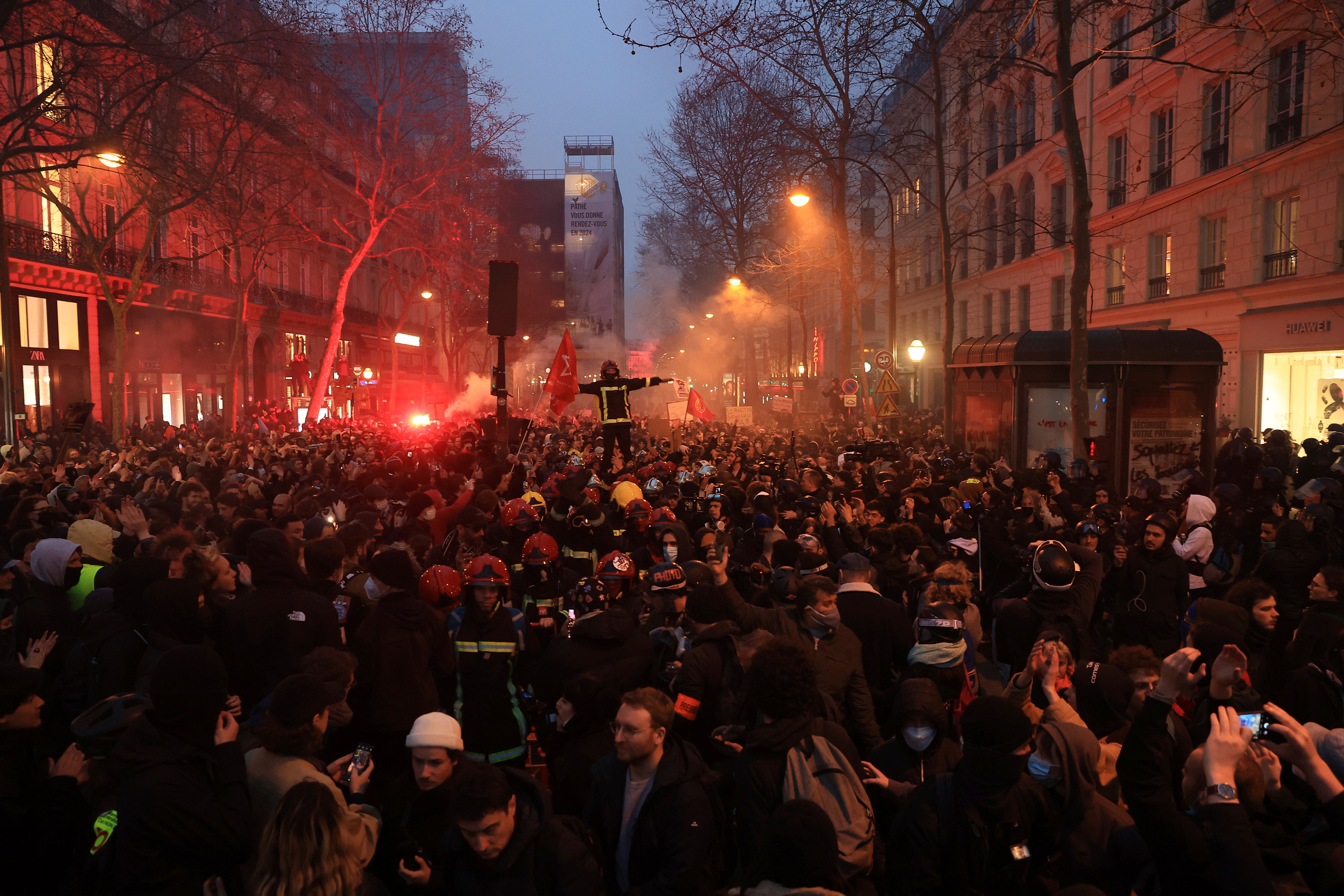Why are there protests in France?
Emmanuel Macron’s push to raise retirement age without vote in National Assembly sparks nationwide outrage
France has been rocked by angry protests across the country, with demonstrators blocking airports and railway stations and even setting fire to Bordeaux’s city hall.
Hundreds of arrests have been made, Molotov cocktails thrown and tear gas dispersed in crowd clashes nationwide while essential services have been disrupted, oil and gas deliveries stalled and tourist attractions like the Eiffel Tower closed to shield them from vandalism.
More than a million people are believed to have taken part in Thursday’s strikes, the biggest day of demonstrations so far, with 119,000 people marching through Paris as videos of chaos and looting flooded social media, including footage of both riot police and activists being led away from the fray injured.
Some 441 police officers were injured and 475 people are understood to have been arrested on what has been dubbed “Black Thursday”, placing renewed pressure on French president Emmanuel Macron to find a way out of the conflict.
Interior minister Gerald Darmanin meanwhile denounced the “unacceptable assaults and damage” and said such behaviour “cannot remain unpunished”. “There are troublemakers, often extreme left, who want to take down the state and kill police and ultimately take over the institutions,” he added.
The violence erupted out of rallies organised by unions in opposition to Mr Macron’s divisive new pension reform bill, which includes a provision to raise the legal age of retirement from 62 to 64.
While many already opposed the bill, the president has inspired further democratic outrage by forcing it through parliament without a vote in the National Assembly, a move that appeared to many to stretch his executive power to its outer limit.
To achieve his aim, Mr Macron invoked Article 49.3 of the constitution of the Fifth Republic, which recognises that a curbing of parliamentary oversight can become necessary in emergency conditions and states: “The prime minister, after deliberation by the council of ministers… may bypass a vote in the National Assembly on bills relating to state and social security budgets.”
Elisabeth Borne, Mr Macron’s PM, duly enacted his wishes last week, prompting two no-confidence motions to be launched against the government, a safety brake permitted under the article.

Both motions, however, were rejected by the lower chamber on Monday, further enraging the street protesters.
The bill still faces a review by the Constitutional Council before it can be formally signed into law and the council is in a position to reject articles within the measure if they are felt not to be in line with the constitution.
Opponents argue the text as a whole should be thrown out altogether.
On Wednesday, Mr Macron struck a defiant tone in a television interview, insisting his reforms need to be implemented by the “end of the year” as a matter of financial necessity that cannot be achieved by simply introducing higher taxes for the wealthy, his superior manner entirely failing to calm the tensions.
“Do you think I enjoy making this reform? No. This reform isn’t a luxury, it’s not a pleasure, it’s a necessity,” he said.
While France is, of course, no stranger to grassroots protest movements, most recently the revolt of the gilets jaunes four years ago, Mr Macron made a point of comparing the “extreme violence” seen in recent days to the deadly US Capitol riot of 6 January 2021 and insisted he did not care about sacrificing his popularity for a principle: “Between polls and the general interest of the country, I choose the general interest.”
Philippe Martinez, leader of the hardline CGT union, branded Mr Macron’s performance “outlandish” and said in its aftermath: “The best response we can give the president is to have millions of people on strike and in the streets tomorrow.”
His colleague Laurent Delaporte, who runs the CGT’s port of Le Harve branch, added: “He fanned the flames. How can we hear that the street has no legitimacy?”

Willy Mancel, one of the demonstrators rallying in Nantes, told the press: “The street has legitimacy in France. If Mr Macron can’t remember this historic reality, I don’t know what he is doing here.”
With the protests unlikely to go away unless Mr Macron does reverse course and withdraw the bill, King Charles III has now been forced to postpone a visit to Paris planned for this weekend.
The King and Queen Consort Camilla were due to embark on their three-day trip on Sunday, with a visit to the Musee d’Orsay, a wreath-laying ceremony at the Arc de Triomphe and a lavish dinner at Versailles on the itinerary, a display of wealth, privilege and power decidedly at odds with the revolutionary mood.
CGT members working for Mobilier National, the institution in charge of providing ceremonial decoration for public buildings, had refused to roll out the red carpet for the monarch, who does not enjoy the same popularity in France as his late mother did.
Mr Darmanin had insisted that security posed “no problem” and that the couple would be “welcomed and welcomed well” before the visit was postponed.
Join our commenting forum
Join thought-provoking conversations, follow other Independent readers and see their replies
Comments


Bookmark popover
Removed from bookmarks